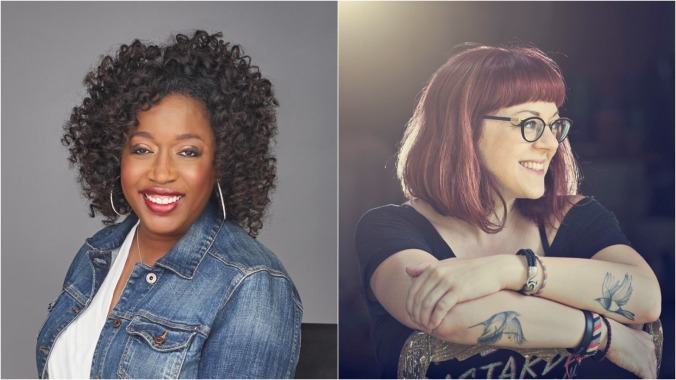Meet the minds behind First Kill, Netflix's queer vampire romance
Series creator V.E. Schwab: "If I had a show like First Kill when I was 16, it probably wouldn’t have taken me till 27 to realize I was gay"

We’ve seen it all before: a young woman fighting the forces of evil while juggling her social and academic lives. During the day, she’s a normal girl, but at night she’s a vampire hunter. Something else we’ve seen? That assassin falling in love with a kindhearted would-be victim, much to the chagrin of those around her. Buffy The Vampire Slayer did it first on TV back in 1997, and 22 years later Netflix’s First Kill is here to add some much-needed updates to the tale, including a diverse set of characters and a queer love story as a centerpiece.
First Kill tells the coming-of-age stories of two teenage girls in Savannah, Georgia. Calliope Burns (Imani Lewis), who comes from a militant family of revered monster hunters, is finally brought in from the sidelines and allowed to take down her first evil fiend. On the other side of town, Juliette Fairmont (Sarah Catherine Hook) is descended from a lineage of legacy vampires. As she begins to develop a taste for blood, her parents push her to suck the life from her first unsuspecting victim. The two girls inevitably cross paths as they attend Lancaster Academy, kicking off the show’s love story.
Ahead of the June 10 series premiere, The A.V. Club sat down to talk with the show’s creator, Victoria “V.E.” Schwab, who published the story/source material “First Kill” in 2020, and showrunner Felicia Henderson about bringing the queer vampiric romance from page to screen.
The A.V. Club: What were your visions when it came to expanding this story?
V. E. Schwab: I wrote the short story with a pilot in mind, so I was kind of always envisioning the starting block rather than the rest of the race. But I knew I wanted to have a world where setting was character. I wanted to have a world where we have these two forces in opposition, but each one is beautiful and whole and powerful. So really, while the short story really focuses on Juliette and Calliope, it was always my hope that it would become a show about family. Being at the age when your identity goes from being a family identity, with all of the family indoctrination that you’re brought up with, to that moment when you have an individual identity and you have to decide if you’re going to go a direction that might oppose the way you’ve been raised.
AVC: Felicia, how did you get pulled into this universe?
Felicia Henderson: [Laughs] Stomping and screaming mostly, but very happily at the end of the day. I was researching one project and writing another, and my manager said, “There’s this script I think you should really read.” I was like, “You know how busy I am! What are you doing? Leave me alone!” I said no to him a couple of times and then he just sent [it] and said, “Well, just in case you have a moment.” And I thought, this must really be important. I read it, and I think I was halfway through before I just stopped and said, “Just get me the meeting.”
Then, I got the opportunity to meet Victoria and the women at Belletrist, and I was just so excited about working with them. I loved the idea of powerful women creating stories about powerful women. As a person who has young queer girls in my life, I was interested in a world that loved them in the way that I love them. This wasn’t a coming-out story; it was about investigating their lives as three-dimensional characters. And of course, I saw that there’s a Black family of monster hunters! I got so excited about that because we also don’t see that nearly enough, which made me immediately love Victoria, that she would see that there was that void and decide to fill it.
AVC: Victoria, what are your influences for this story? And how did you step away from traditional vampiric tropes?
VS: I grew up with my two pillars: Buffy and Supernatural. Those are my families; those are my loves. But the fact is I didn’t see myself in them. I often joke—it’s not really a joke though—that if I had a show like First Kill when I was 16, it probably wouldn’t have taken me till 27 to realize I was gay. I think that’s the beauty of mirrors. As a novelist, I am very aware how often we see queer narratives but [they’re] about queerness. You can have a queer love story, but it better be about coming out. Straight characters don’t get reduced to their identity in a narrative, and it seems like the only time certain people get to take up space is [with] their identity. So it was both the love of these things I grew up with, like Buffy and Supernatural, and also the absences I saw in them that I wanted to write to.